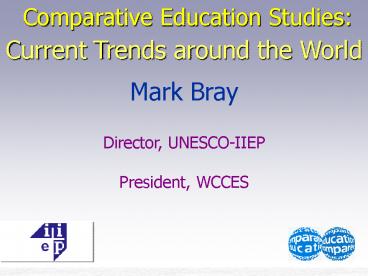Comparative Education Studies: - PowerPoint PPT Presentation
1 / 25
Title: Comparative Education Studies:
1
Comparative Education Studies Current Trends
around the World Mark Bray Director,
UNESCO-IIEP President, WCCES
2
Introduction
- My own background and perspective
- UNESCO International Institute for Educational
Planning (IIEP) - World Council of Comparative Education Societies
(WCCES)
3
- United Nations Educational, Scientific and
Cultural Organization - Headquarters in Paris, and with global network of
regional bureaus, cluster and national offices - Established 1945
4
UNESCOs Education-Sector Institutes
- International Bureau of Education (IBE) Geneva,
Switzerland - UNESCO Institute for Education (UIE) Hamburg,
Germany - International Institute for Educational Planning
- Institute for Information Technologies in
Education (IITE) Moscow, Russia - International Institute for Higher Education in
Latin America the Caribbean (IESALC) Caracas,
Venezuela - International Institute for Capacity-Building in
Africa (IICBA) Addis Ababa, Ethiopia
5
The IIEP
- Created in 1963 on an innovative model
- 100 staff
- headquartered in Paris
- Buenos Aires branch opened 1997
6
Three main domains of IIEP work
- Training
- Research
- Operational activities
7
- Website
- www.unesco.org\iiep
- www.iipe-buenosaires.org.ar
8
Enrolment Rates
The WCCES and its Member Societies
- Founded 1970
- Comparative International Education Society
(CIES) (USA) - Comparative Education Society in Europe (CESE)
- Japan Comparative Education Society (JCES)
- Comparative International Education Society of
Canada (CIESC) - Korean Comparative Education Society (KCES)
9
Enrolment Rates
The WCCES and its Member Societies
- Now 35 societies
- 27 national and sub-national
- 6 regional
- 2 language-based
10
Enrolment Rates
WCCES Activities
- World Congresses, every 3 years
- 1998 South Africa (Africa)
- 2001 Korea (Asia)
- 2004 Cuba (Latin America)
- 2007 Bosnia Herzegovina (Europe)
11
Enrolment Rates
WCCES Activities
- 13th World Congress
- 3-7 September 2007
12
Balances and Opportunities in the Operation of a
Global Body
- WCCES Membership
- Some regions are better represented than others
- Location of WCCES Meetings
- The locations of meetings influence which
societies can attend, and so whose voices are
heard
13
The evolving field of comparative education
- Changes over time
- The field is making important progress, but
needs further strengthening and leadership
14
- Comparative education scholars in different
parts of the world have different focuses and
emphases - different themes for research
- different theoretical frameworks
- different countries (and other units) chosen for
analysis
15
Foci of Enquiry
Overlapping fields
Comparative Education
International Education
16
Units of Analysis in Comparative Education
- Dominance of countries
- Also much focus on continents/world regions
17
Units of Analysis in Comparative Education
- A cube for multilevel comparison
18
A pair of benchmarks
- UK Journal
- Comparative Education
- 1977 special issue
- 2000/01
- millennial special issue
- follow-up special issue
19
Some salient points
- Growth of the field
- Stronger optimism
- New tools, e.g. in information technology
- New themes, e.g. globalisation
- More varied and multi-level units of analysis
20
Methodology and Focus in Comparative Education
- Heavily dominated by social sciences, and
therefore influenced by shifts in paradigms. - But limited use of social-science tools. Many
studies based on literature review relatively
few based on survey almost none based on
experimental methods.
21
Methodology and Focus in Comparative Education
- Qualitative studies more common than
quantitative ones - But different emphases in different parts of the
world Comparative Educations
22
Methodology and Focus in Comparative Education
Paulston (1997)
23
Methodology and Focus in Comparative Education
- Plurality in the field partly arises from
paradigmatic differences between different groups
of scholars. - Differences may be exacerbated when those
scholars are from different countries and work in
different languages.
24
Conclusions
- Comparative education is an exciting field in
which we can learn from each other - Much needs to be done to improve quality of
scholarship and to promote networking - In this, we can each play a role!
25
The end
- www.unesco.org/iiep
- www.hku.hk/cerc/wcces

